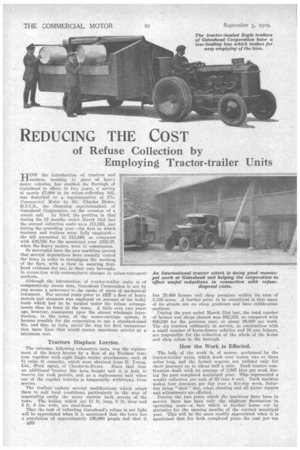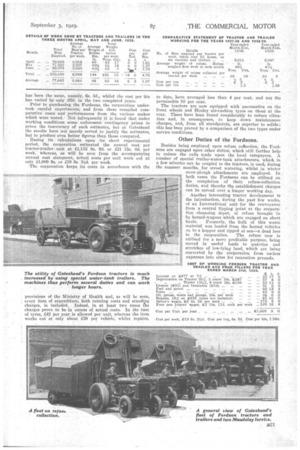REDUCING THE COST
Page 64

Page 65

If you've noticed an error in this article please click here to report it so we can fix it.
of Refuse Collection by Employing Tractor-trailer Units
"[IOW the introduction of tractors and IlLtrailers, working in place of heavy motor vehicles, has enabled the Borough of Gateshead to effect, in two years, a saving of nearly £7,000 in its refuse-collection bill, was described to a representative of The Commercial Motor by Mr. Charles Boden, the cleansing superintendent of Gateshead COrporation, on the occasion of a recent call. In brief, the position is that during the 12 months ended March 31st last the annual collection costs were 113,195, and during the preceding year—the first in which tractors and trailers were fully employed— the bill amounted to f13,446, as compared with f16,758 for the municipal year 1926-27, when the heavy motors were in commission.
So successf al have the new machines proved that several deputations have recently visited the town in order to investigate the working of the fleet, with a view to securing firsthand evidence for use, in their own boroughs, in connection with contemplated changes in refuse-transport, methods.
Although the introduction of tractor-trailer units is of comparatively recent date, Gateshead Corporation is not by any Means a newcomer to the, ranks of users of mechanical transport. For several years prior to 127 a fleet of heavy motors and steamers was employed on account of the bulky loads which had to be tackled under the refuse arrangements then in force in the town. A little over two years ago, however, consequent upon the almost wholesale introduction, in the town, of the water-carriage system, it became possible for the corporation to use a standard-sized bin, and this, in turn, paved the way for fleet reconstruction upon lines that would ensure maximum service at a minimum cost.
Tractors Displace Lorries.
The outcome, following exhaustive tests, was the replacement of the heavy lorries by a fleet of six rordson tractors, together with eight Eagle trailer attachments, each of 8" cubic ft. capacity, which were obtained from H. Young, Ltd., Ford agent, of Chester-le-Street. Since that time an additional 'tractor has been bought and it is held in reserve for rush periods, and as a replacement unit when one of the regular vehicles is temporarily withdrawn from service.
The trailers embody several modifications which adapt them to suit local conditions, particularly in the way of negotiating easily the many narrow back streets of the town. The bodies, which are 11 ft. long, 3 ft. deep and 6 ft. 6 ins. wide, are steel-lined.
That the task of collecting Gateshead's refuse is not light will he appreciated when it is mentioned that the town has a population of approximately 130,000 people and that it
1330 has 28,460 houses and shop premises within its area of 3,132 acres. A further point to be considered is that many of its streets are on steep gradients and have cobble-stone • surfaces.
During the year ended March 31st last, the total number of houses and shops cleared was 982,155, as compared with 966,540 for the previous year, or about 20,000 per week. The six tractors ordinarily in service, in conjunction with a small number of horse-drawn vehicles and 38 pan helpers, are responsible for the collection of the whole •of the house and shop refuse in the borough.
How the Work is Effected.
The bulk of the work is, of course, performed by the tractor-trailer units, which work over routes two or three miles long, and the horsed wagons are utilized only for short journeys up to about half a mile. Each tractor combination dealt with an average of 2,947 bins per week during the past completed municipal year. This represented a weekly collection per unit of 62 tons 9 ewt. Each machine makes four journeys per day over a five-day week, Saturday being " shed " day, when cleaning and all minor repairs and adjustments are effected.
During the two years which the machines have been in service there has been only the slightest fluctuation in operating costs—a fact which is further borne out by statistics for the opening months of the current municipal year. This will be the more readily appreciated when it is mentioned that for both completed years the cost per ton has been the same, namely, 6s. 34., whilst the cost per bin has varied by only .02d. in the two completed years.
-Prior to purchasing the Fordsons, the corporation undertookcareful experiments, and from these compiled comparative costs and performances from the various makes which were tested.. Not infrequently it is found that under working conditions some unforeseencontingency arises to prove the inaccuracy of such estimates, but at Gateshead the results have not merely served to justify the estimates, but to produce even better figures than those computed.
• Basing its calculations upon 'its' short experimental period, the corporation estimated the annual cost. per tractor-trailer unit at i1,132 Ss. 6d. or 121 15s. Od. per week, Whereas, as will be seen from the accompanying
• annual cost statement, actual costs per unit work out at only £1,009 9s. or 119 Ss.. 51d. per week. The corporation keeps its costs in accordance with the provisions of the Ministry of Health and, as will be seen, every item of expenditure, both 'ginning costs and standing charges, is included. Indeed, in at least two cases the charges prove to be in exeess of actual costs. In the case of tyres, £42 per year is allowed per unit, whereas the item works out at only about £30 per vehicle, whilst repairs,
to date, have averaged less than 4 per cent. and not the permissible 10 per cent.
The tractors are now equipped with pneumatics on the front wheels and Henley air-cushion tyres on those at the rear. These have been found considerably to reduce vibration and, in consequence, to keep down maintenance charges, and, from all standpoints, are superior to solids; this has been proved by a comparison of the two types under service conditions.
Other Duties of the Fordsons.
Besides being employed upon refuse collection, the Fordsons are engaged upon other duties, which still further hell) to reduce the calls made upon the local ratepayers. A number of special trailer-water-tank attachments, which in a few minutes can be coupled to the tractors, is used, during the summer months, for street watering, whilst in winter snow-plough attachments are employed. In
both cases the Fordsons can be utilized on the completion of their refuse-collection duties, and thereby the establishment charges can be spread over, a longer working day.
Another interesting tractor development is the introduction, during the past few weeks, of an International unit. for the conveyance from a central tipping point at the corporation cleansing depot, of refuse brought in by horsed-wagons which are engaged on short hauls. Formerly, the bulk of this waste material was loaded from the horsed vehicles on to a hopper and tipped at sea—a dead loss to the corporation. The refuse now is utilized for a more profitable purpose, being moved in useful loads to quarries and stretches of low-lying land, which are being converted by the corporation from useless expanses into sites for recreation grounds,




















































































































